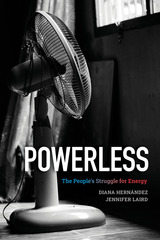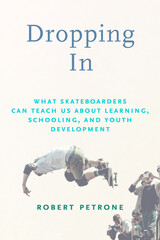
The die-hard local skateboarders of Franklin Skatepark—a group of working-class, Latino and white young men in the rural Midwest—are typically classified by schools and society as “struggling,” “at-risk,” “failing,” and “in crisis.” But at the skatepark, they thrive and succeed, not only by landing tricks but also by finding meaning and purpose in their lives.
In Dropping In, Robert Petrone draws from multiple years of ethnographic research to bring readers into this rich environment, exploring how and why these young men engage more with skateboarding and its related cultural communities than with school. For them, it is in these alternative communities and spaces that they meet their intellectual, literate, and learning needs; cultivate meaningful and supportive relationships; and develop a larger understanding of their place in the world. By looking at what these skateboarders can teach us about what is right and working in their lives, Petrone asks educators and others committed to youth development to rethink schooling structures and practices to provide equitable education for all students.
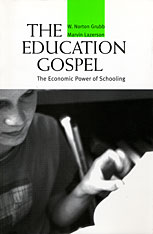
In this hard-hitting history of "the gospel of education," W. Norton Grubb and Marvin Lazerson reveal the allure, and the fallacy, of the longstanding American faith that more schooling for more people is the remedy for all our social and economic problems--and that the central purpose of education is workplace preparation.
But do increasing levels of education accurately represent the demands of today's jobs? Grubb and Lazerson argue that the abilities developed in schools and universities and the competencies required in work are often mismatched--since many Americans are under-educated for serious work while at least a third are over-educated for the jobs they hold. The ongoing race for personal advancement and the focus on worker preparation have squeezed out civic education and learning for its own sake. Paradoxically, the focus on schooling as a mechanism of equity has reinforced social inequality. The challenge now, the authors show, is to create environments for learning that incorporate both economic and civic goals, and to prevent the further descent of education into a preoccupation with narrow work skills and empty credentials.

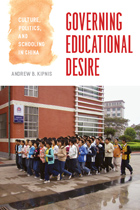
Parents in China greatly value higher education for their children, but the intensity and effects of their desire to achieve this goal have largely gone unexamined—until now. Governing Educational Desire explores the cultural, political, and economic origins of Chinese desire for a college education as well as its vast consequences, which include household and national economic priorities, birthrates, ethnic relations, and patterns of governance.
Where does this desire come from? Andrew B. Kipnis approaches this question in four different ways. First, he investigates the role of local context by focusing on family and community dynamics in one Chinese county, Zouping. Then, he widens his scope to examine the provincial and national governmental policies that affect educational desire. Next, he explores how contemporary governing practices were shaped by the Confucian examination system, uncovering the historical forces at work in the present. Finally, he looks for the universal in the local, considering the ways aspects of educational desire in Zouping spread throughout China and beyond. In doing so, Kipnis provides not only an illuminating analysis of education in China but also a thought-provoking reflection on what educational desire can tell us about the relationship between culture and government.
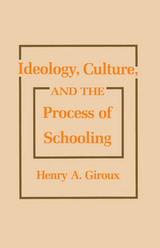
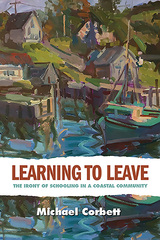
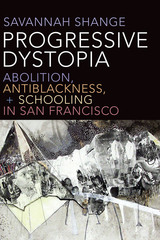
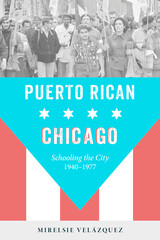
Winner of the Critics’ Choice Book awards of the American Educational Studies Association (AESA-CCBA)
The postwar migration of Puerto Rican men and women to Chicago brought thousands of their children into city schools. These children's classroom experience continued the colonial project begun in their homeland, where American ideologies had dominated Puerto Rican education since the island became a US territory. Mirelsie Velázquez tells how Chicago's Puerto Ricans pursued their educational needs in a society that constantly reminded them of their status as second-class citizens. Communities organized a media culture that addressed their concerns while creating and affirming Puerto Rican identities. Education also offered women the only venue to exercise power, and they parlayed their positions to take lead roles in activist and political circles. In time, a politicized Puerto Rican community gave voice to a previously silenced group--and highlighted that colonialism does not end when immigrants live among their colonizers.
A perceptive look at big-city community building, Puerto Rican Chicago reveals the links between justice in education and a people's claim to space in their new home.

Here is a sober report by fifteen of the nations leading experts on desegregation, the product of an American Academy study group that met to assess the radically changed character of the urban school desegregation struggle over the quarter century since the Supreme Court”s landmark decision. The distinguished contributors differ sharply in their ideas about the nature of this vexing social problem and in their proposed remedies. They grapple with the range of relevant issues, from the effects of desegregation on children to societal attitudes, demographic developments, “white flight,” resegregation, incentives and other policy options, individual versus group rights, and ethical and legal considerations.
This is a book that reaches beyond the old disputes about busing to consider the issue in new ways and to suggest new options. If there are no quick solutions to the schooling problems in the nation’s big cities, neither is there any excuse for ignorance about this matter. Rich in its implications for the future, Race and Schooling in the City offers fresh assessments of one of the country’s most visible and intractable controversies.
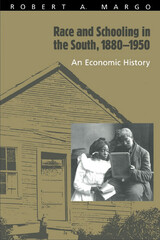
"A concise, lucid account of the bases of racial inequality in the South between Reconstruction and the Civil Rights era. . . . Deserves the careful attention of anyone concerned with historical and contemporary race stratification."—Kathryn M. Neckerman, Contemporary Sociology
"Margo has produced an excellent study, which can serve as a model for aspiring cliometricians. To describe it as 'required reading' would fail to indicate just how important, indeed indispensable, the book will be to scholars interested in racial economic differences, past or present."—Robert Higgs, Journal of Economic Literature
"Margo shows that history is important in understanding present domestic problems; his study has significant implications for understanding post-1950s black economic development."—Joe M. Richardson, Journal of American History
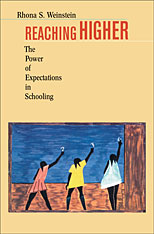
“She has a funny way of looking at you,” a fourth-grader told Rhona Weinstein about his teacher. “She gets that look and says ‘I am very disappointed in you.’ I hate it when she does that. It makes me feel like I’m stupid. Just crazy, stupid, dumb.” Even young children know what adults think of them. All too often, they live down to expectations, as well as up to them. This book is about the context in which expectations play themselves out.
Drawing upon a generation of research on self-fulfilling prophecies in education, including the author’s own extensive fieldwork in schools, Reaching Higher argues that our expectations of children are often too low. With compelling case studies, Weinstein shows that children typed early as “not very smart” can go on to accomplish far more than is expected of them by an educational system with too narrow a definition of ability and the way abilities should be nurtured. Weinstein faults the system, pointing out that teachers themselves are harnessed by policies that do not enable them to reach higher for all children.
Her analysis takes us beyond current reforms that focus on accountability for test results. With rich descriptions of effective classrooms and schools, Weinstein makes a case for a changed system that will make the most of every child and enable students and teachers to engage more meaningfully in learning.

How should we educate the children of tomorrow to solve the problems of today?
A new educational model is generating widespread interest and excitement among educators, parents, and community leaders. Known as "cognitive apprenticeship", the model draws upon contemporary cognitive and developmental science and specifies techniques for capitalizing on children's inborn ability to learn in complex natural settings. Sylvia Farnham-Diggory reports on a wide range of school programs that illustrate this innovative approach to schooling.
The new approach contrasts sharply with much current school practice, which is based on early twentieth-century theories of learning. These early theories, in misguided attempts to be "scientific", defined the acquisition of knowledge in terms of simple, quantifiable test behaviors. School practice derived from such outdated theory continues to revolve around fragmented lessons that can be easily counted and graded.
New research in cognition and human development shows that the acquisition of knowledge must be defined in terms of complex interactive networks. It cannot be acquired from workbooks or ditto sheets, nor can it be assessed through paper-and-pencil tests. Mastery of basic skills, a delight in history, literature, and science, and a creative approach to problem solving are best encouraged when children have opportunities to work alongside experts in meaningful and important contexts, thus participating in cognitive apprenticeships.
While never losing sight of her theoretical framework, Farnham-Diggory offers many practical suggestions for transforming classrooms into places of genuine intellectual growth. Schooling sets out a creative and realistic agenda for parents, teachers, school administrators, business leaders, and other concerned citizens who are looking for ways to replace traditional 1930s-style classrooms with rigorous and exciting educational environments.

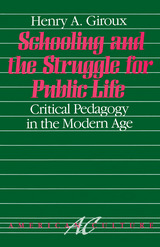
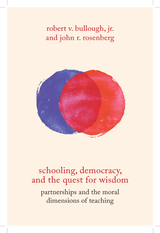
In response to growing concern in the 1980s about the quality of public education across the United States, a tremendous amount of energy was expended by organizations such as the Holmes Group and the Carnegie Forum to organize professional development schools (PDS) or “partner schools” for teacher education. On the surface, the concept of partnering is simple; however, the practice is very costly, complex, and difficult. In Schooling, Democracy, and the Quest for Wisdom, Robert V. Bullough, Jr. and John R. Rosenberg examine the concept of partnering through various lenses and they address what they think are the major issues that need to be, but rarely are, discussed by thousands of educators in the U.S. who are involved and invested in university-public school partnerships. Ultimately, they assert that the conversation around partnering needs re-centering (most especially on the purposes of public education), refreshing, and re-theorizing.
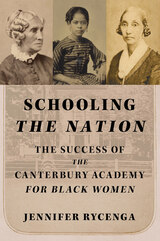
Jennifer Rycenga recovers a pioneering example of antiracism and Black-white cooperation. At once an inspirational and cautionary tale, Canterbury Academy succeeded thanks to far-reaching networks, alliances, and activism that placed it within Black, women’s, and abolitionist history. Rycenga focuses on the people like Sarah Harris, the Academy’s first Black student; Maria Davis, Crandall’s Black housekeeper and her early connection to the embryonic abolitionist movement; and Crandall herself. Telling their stories, she highlights the agency of Black and white women within the currents, and as a force changing those currents, in nineteenth-century America.
Insightful and provocative, Schooling the Nation tells the forgotten story of remarkable women and a collaboration across racial and gender lines.
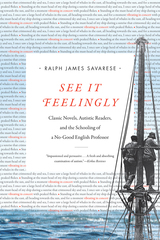
Since the 1940s researchers have been repeating claims about autistic people's limited ability to understand language, to partake in imaginative play, and to generate the complex theory of mind necessary to appreciate literature. In See It Feelingly Ralph James Savarese, an English professor whose son is one of the first nonspeaking autistics to graduate from college, challenges this view.
Discussing fictional works over a period of years with readers from across the autism spectrum, Savarese was stunned by the readers' ability to expand his understanding of texts he knew intimately. Their startling insights emerged not only from the way their different bodies and brains lined up with a story but also from their experiences of stigma and exclusion.
For Mukhopadhyay Moby-Dick is an allegory of revenge against autism, the frantic quest for a cure. The white whale represents the autist's baffling, because wordless, immersion in the sensory. Computer programmer and cyberpunk author Dora Raymaker skewers the empathetic failings of the bounty hunters in Philip K. Dick's Do Androids Dream of Electric Sheep? Autistics, some studies suggest, offer instruction in embracing the nonhuman. Encountering a short story about a lonely marine biologist in Antarctica, Temple Grandin remembers her past with an uncharacteristic emotional intensity, and she reminds the reader of the myriad ways in which people can relate to fiction. Why must there be a norm?
Mixing memoir with current research in autism and cognitive literary studies, Savarese celebrates how literature springs to life through the contrasting responses of unique individuals, while helping people both on and off the spectrum to engage more richly with the world.
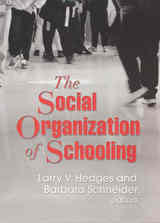

Guiding this volume is the conviction that advances in technology do not necessarily translate into improvements in education even as the basic structure of teaching programs must be changed to fully exploit the educational uses of technology. The contributors argue that technology should be distributed throughout the educational system, not just in wealthy districts; they examine the impact of communications technologies on relationships between teachers and students, parents and children, and men and women; they consider the ways in which new technologies change the dynamics of learning and teaching; and they show how teachers and administrators can tailor technology-based programs to the particular needs of their school or district.
READERS
Browse our collection.
PUBLISHERS
See BiblioVault's publisher services.
STUDENT SERVICES
Files for college accessibility offices.
UChicago Accessibility Resources
home | accessibility | search | about | contact us
BiblioVault ® 2001 - 2025
The University of Chicago Press




